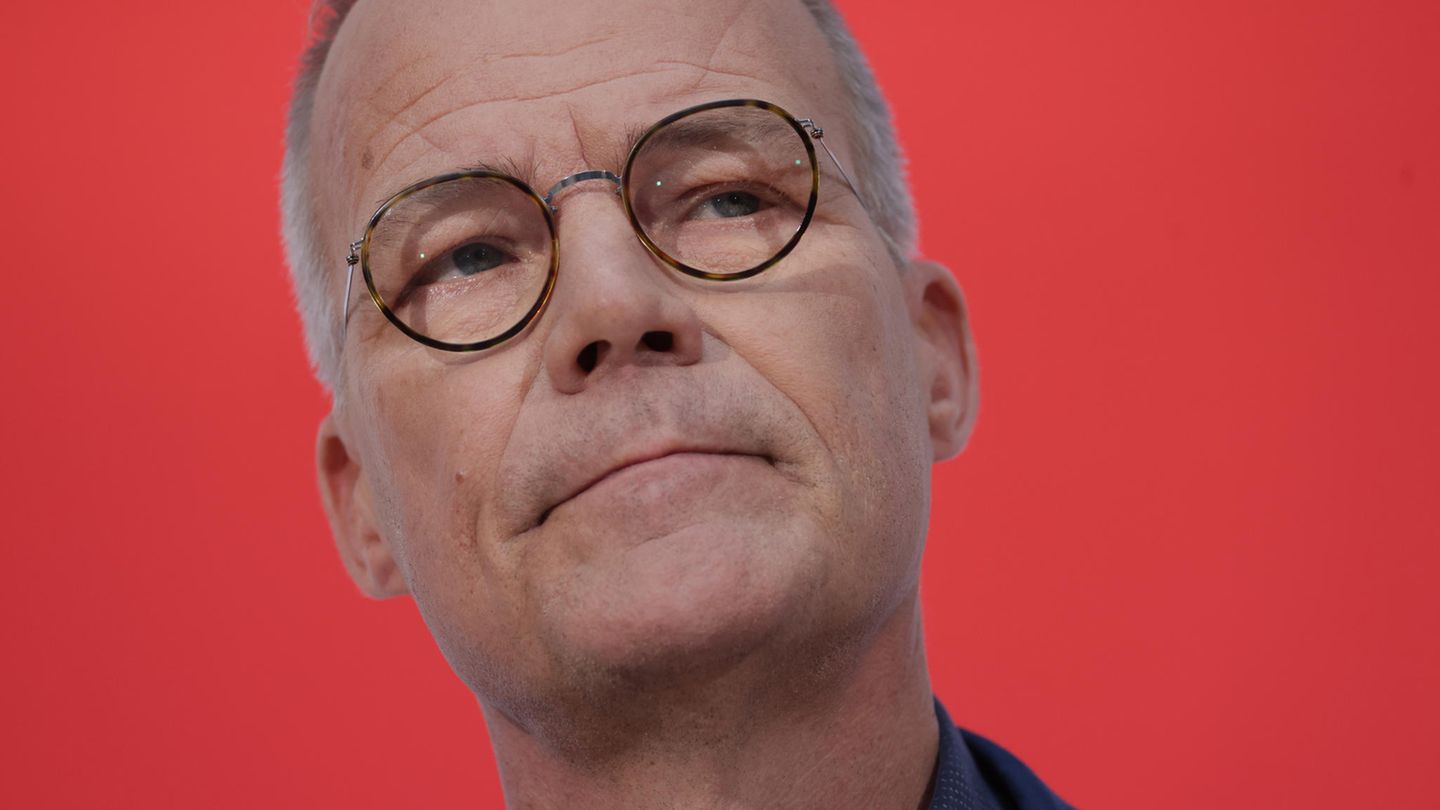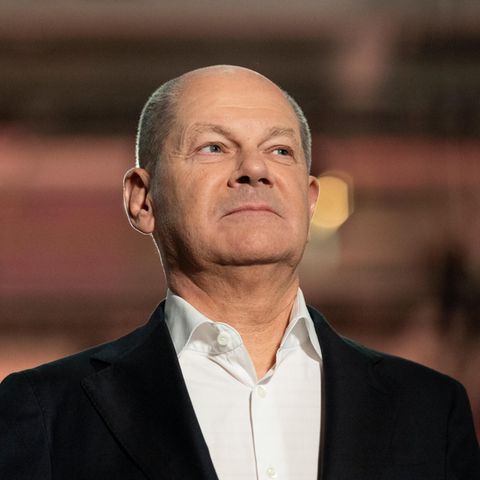interview
SPD General Secretary Miersch: “The Union will not get the Chancellery”
Copy the current link
The SPD is tumbling through the polls, but its general secretary is certain: not for long. Matthias Miersch on the weaknesses of the competition and the Chancellor’s race to catch up.
Mr. Miersch, you were 100 days ago SPD– Became Secretary General, elections will take place in 39 days. What kind of hell did you get yourself into?
The job is exciting and enriching, and of course also demanding. But that’s part of the responsibility that I’m happy to take on.
Do you ever switch off?
I consciously take space to breathe deeply.
According to the current surveys, the Union has taken the Chancellery from you in 100 days, the SPD has been cemented between 14 to 16 percent for weeks. Why?
The Union will not get the Chancellery. The election campaign has just begun. In the next few weeks people will look at the programs and recognize the big differences between the SPD and CDU/CSU, and not just in terms of staff. Friedrich Merz stands for a politics of yesterday: He is against e-mobility, against wind power and now he is also railing against sustainable steel. In doing so, it unsettles entire industries. The SPD fights for a strong economy and every job. And that some of the economic growth also reaches ordinary people.
So yes: with an SPD government, the minimum wage will rise to 15 euros
The SPD is trying Olaf Scholz to stage himself as a savior in times of need – even though he brought about the needs himself. How does that fit together?
With respect, it was Putin who brought war to Europe. We are still feeling the consequences today. Nevertheless, Olaf Scholz secured energy supplies, stabilized prices and led a difficult coalition in difficult times. As we now know, the FDP provoked and planned their break. In uncertain times, when the future US President is Donald Trump, citizens will remember who led this country through difficult times. The cards are now being reshuffled.
The SPD promises in the program sound all well and good, but many details are open, starting with the minimum wage. It should be 15 euros “from 2026 at the latest” – by setting it politically again?
We are giving the Minimum Wage Commission the chance to take the European Minimum Wage Directive into account. We’ll wait and see what she decides. In the end, as in 2021, we can replace the deadlock in the Commission with legislative action. So yes: with an SPD government, the minimum wage will rise to 15 euros.
Scholz wants to “hold the one percent with the highest incomes a little more accountable.” How?
Above all, we want to noticeably relieve the burden on 95 percent of taxpayers. Life has become more expensive in recent years, especially for families. We are relieving the burden on skilled workers in that the top tax rate will only apply to singles from an annual gross income of 93,000 euros – but will increase from 42 to 45 percent. The tax rate for the rich, which only the absolute top earners pay, is also to be increased from 45 to 47 percent. In the end, couples with an annual income of 284,000 euros or more pay more according to our model. That’s fair. And in contrast to the CDU, which promises the blue sky, our proposals are solidly financed.
And what exactly does the SPD have in mind when reintroducing wealth tax and higher inheritance tax? Don’t give any numbers here.
We are concerned with assets worth millions and a high level of wealth when it comes to inheritances – not just the inherited single-family home. The wealth tax is a country tax. The money we earn from this should be used by the federal states for targeted investments in education. For example, to finance free lunch in schools, with which we relieve the burden on families and ensure a warm lunch for every child.
What do you mean by “million dollar fortune”? Does the new wealth tax apply from one million euros?
No, it won’t start at one million euros. We will specify the numbers as part of the legislation.
Green Party candidate for chancellor Robert Habeck calls for a “billionaire tax”. Why doesn’t the SPD actually come up with such an idea?
In my opinion, Mr. Habeck’s billionaire tax comes too late. Multimillionaires can also take on more responsibility, not just billionaires. Our concept is more targeted.
Less kitchen table and more desk would be good for Habeck
But basically Habeck is doing quite well in the election campaign, isn’t he? Appears approachable at the kitchen table, aggressive in arguments…
Less kitchen table and more desk would be good for Habeck. Our country is in the middle of a recession and the economics minister finds the time to write books, but leaves important legislative proposals such as the power plant strategy on hold. The priorities are wrong here.
We have the impression that the SPD doesn’t say a single word about Habeck in the election campaign. Out of fear that he will become Friedrich Merz’s main opponent?
The SPD is certainly not afraid of Mr. Habeck. The duel for the chancellorship is taking place between opposition leader Friedrich Merz and Chancellor Olaf Scholz.
Looking at the current surveys, Scholz and Habeck are currently in a duel for third place.
The polls are very volatile. In all but one, we are ahead of the Greens. But these are all snapshots. The fact is: the incumbent Chancellor is up for election against Friedrich Merz, the opposition leader.
The SPD is relying on an election campaign to differentiate itself from the “Merz-CDU”. Can only bad-mouthing others save Scholz’s chancellorship?
No. Now the programs are available and the differences become clear. We have already talked about Friedrich Merz’s tax plans. Someone who earns a million a year pays us 20,000 euros more so that the remaining 95 percent can be relieved. The CDU will give millionaires a relief of 24,000 euros. That’s absurd and shows who Friedrich Merz is doing politics for.
Which coalition is the SPD relying on?
First of all, I’m counting on the SPD to continue to provide the chancellor. The basic rule is that all parties in the democratic center must be capable of forming coalitions. But I also say: not at every price.
What do you mean?
There must be basic principles. You can be quite sure that the SPD will under no circumstances support a redistribution in favor of the top ten percent.
Can you – like the Chancellor – imagine a renewed coalition with the FDP?
Planning to break the coalition destroyed a lot of trust, including on a personal level.
As things stand, a grand coalition led by the Union is the only realistic power option for the SPD…
…I don’t think about these questions. The first thing now is for the SPD to become the strongest force.
The dispute in the traffic light coalition had destructive elements
Your competitors are more transparent: the CSU excludes black and green, the FDP aggressively promotes black and yellow. Don’t you want to tell the voters where you stand with the SPD?
Such a determination would be dishonest. Nobody can predict the election result. It is respect for the voter to wait for the result, evaluate it and then start negotiations. Mr. Söder changes his mind every other day. He is also very changeable when it comes to questions of content. It’s obvious that he’s tactical.
Union Chancellor candidate Merz expects an SPD result of over 20 percent. How much do you trust the CDU?
Good try. I think it’s funny to speculate about numbers now. First of all it’s about content, then after the election it’s about percentage points. Not the other way around.
During the election campaign there is unanimous talk of damn serious times that would require quick action. Does the next federal government have to be in place by Easter?
A new government by Easter would be desirable. Donald Trump questions European borders. People worry about their jobs. The economy needs to be stimulated again. The next government must create stability quickly and urgently, also in order to effectively counter right-wing extremists.
So argue less than at traffic lights?
Conflict is part of politics. How the dispute is fought is the crucial question. The dispute in the traffic light coalition had destructive elements, which we saw in the FDP script for the coalition break. Democracy as a whole suffers from this.
What does the new federal government have to address and implement in its first 100 days?
For an SPD government, I can say that we will quickly provide impetus to stimulate the economy. We have to secure jobs now. We also want to quickly relieve the burden on 95 percent of taxpayers. Both are central to us, as is stabilizing the pension level – the legal regulation we have so far will expire in the summer.
Do you want to remain general secretary even after the election?
I learned to love the position, especially the creative opportunities. I would like to continue as SPD general secretary – provided the party wants that too.
Source: Stern
I have been working in the news industry for over 6 years, first as a reporter and now as an editor. I have covered politics extensively, and my work has appeared in major newspapers and online news outlets around the world. In addition to my writing, I also contribute regularly to 24 Hours World.






